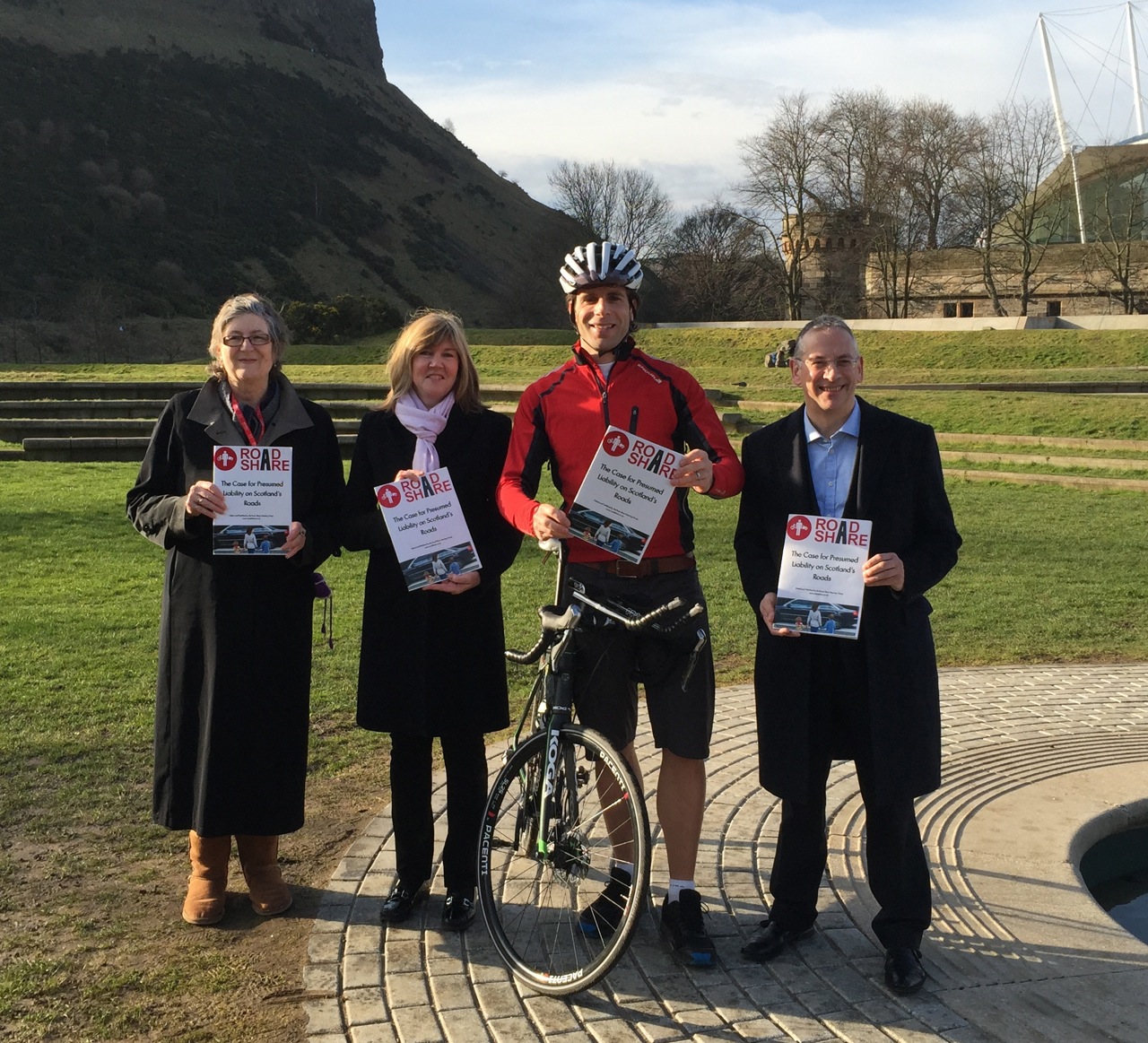11/03/2015
Adventurer Mark Beaumont delivers Road Share research calling for the introduction of Presumed Liability for vulnerable road users

New research shows that government attempts to encourage active travel are being hampered by a lack of legislation that protects walkers and cyclists.
Scotland is falling well behind its European neighbours in
promoting walking and cycling. Some European cities have over 55
per cent of trips being made by walking and cycling but despite
huge efforts even Edinburgh as Scotland’s walking and cycling
capital has achieved only 30% of trips by active modes.
Analysis
of road casualty statistics in the report reveals that walking and
cycling are becoming relatively less safe when compared to car
travel in Scotland. In just over a decade the risk of walking a
mile compared with driving a mile has grown 37% to make it 19 times
more dangerous to walk than take the car.
Countries
with high levels of walking and cycling and low casualty rates have
some form of presumed liability legislation and there is a clear
and strong association between presumed liability and higher levels
of safe walking and cycling.
Produced
by the Road Share campaign group, the report, presented to
ministers on Wednesday 11 March 2015 by adventurer and campaign
supporter Mark Beaumont, provides evidence supporting the inclusion
of new liability laws within a balanced package of measures to
ensure that the drive to increase active travel is matched by
improved safety and protection for vulnerable road users.
Along
with the report, Mark Beaumont, presented a petition of more than
8,200 names calling on the Scottish Parliament to introduce
presumed liability into Civil Law on Scotland's roads.
The
research found that the UK is increasingly lagging behind its
European neighbours who have introduced road traffic liability laws
in recent decades. A recent OECD report showed that successful
cycling promotion depended on having the right legislation in
place.
The
campaigners argue that the current situation where vulnerable road
users who cause the least harm are also the least protected by the
law, does not sit comfortably for a mature and socially conscious
nation. Walkers and cyclists seriously injured in a road traffic
accident and the families of those killed typically battle through
the legal process for well over two years before receiving
compensation.
Brenda
Mitchell, the founder of the campaign and a personal injury lawyer
with Cycle Law Scotland, said:
“Motorised vehicles
bring the most harm to a collision involving a cyclist or walker
yet this is not reflected in our current road traffic liability
laws that expect those injured or the families of those killed to
go through an often harsh and protracted legal process to gain much
needed treatment, care and compensation. This is a matter of social
justice.
“Presumed
liability laws provide an incentive to exercise care and would be
the catalyst we need for cultural change that values the protection
of the vulnerable and places them at the centre of the legal
process.
“Scotland
has the opportunity to put an end to the grave injustice suffered
by many vulnerable road users and introduce its own forward
thinking system. I hope that our research offers another compelling
reason for this government to embrace the good sense of what we are
proposing.”
Key findings:
Derek
Halden, one of the authors of the report, added:
“The law
currently provides no additional legal protection for our children,
or elderly and disabled people on our roads. This has no place in
modern Scotland.
“The
research shows that socially conscious nations have changed their
laws, and by doing so have enabled more walking and cycling.
Countries with both high levels of walking and cycling and low
levels of casualties have some form of presumed liability
legislation in place”.
“Action over the last 30
years has invested in engineering, education and enforcement
measures to improve road safety but additional action is now
required. Better legislation will not fix all of the current
problems, but without it, further improvements in safety and
encouragement for active travel will be seriously
hampered.”
The Road
Share campaign has set up a steering group to take things
forward.
To find out more about the individual members of the Steering group and its overall remit.
The campaign has attracted Cross Party support at Holyrood. See who is supporting, who is undecided and who doesn't support the campaign.
The
Campaign has successfully attracted a number of celebrity
supporters who feel strongly about the introduction of presumed
liability and have given their support.
Contact us via email at info@roadshare.co.uk
Copyright 2014 © Road Share. All Rights Reserved.
Please Visit Us Again | Thankyou